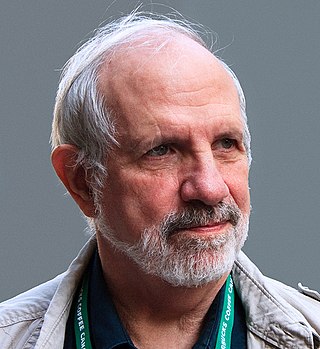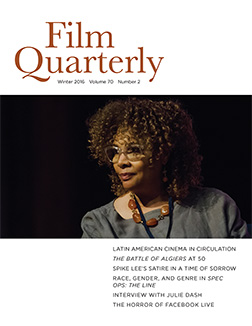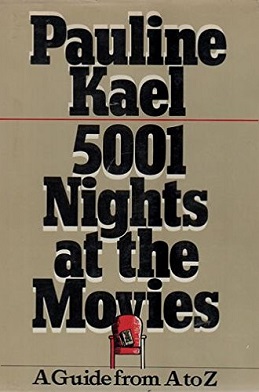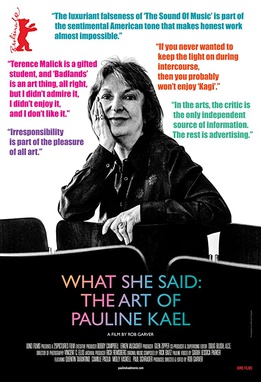
Brian Russell De Palma is an American film director and screenwriter. With a career spanning over 50 years, he is best known for his work in the suspense, crime and psychological thriller genres. His films include mainstream box office hits such as Carrie (1976), Dressed to Kill (1980), Scarface (1983), The Untouchables (1987), and Mission: Impossible (1996), as well as cult favorites such as Sisters (1972), Phantom of the Paradise (1974), Blow Out (1981), Casualties of War (1989), and Carlito's Way (1993).
Andrew Sarris was an American film critic. He was a leading proponent of the auteur theory of film criticism.

Pauline Kael was an American film critic who wrote for The New Yorker from 1968 to 1991. Known for her "witty, biting, highly opinionated and sharply focused" reviews, Kael's opinions often ran contrary to those of her contemporaries.
Renata Adler is an American author, journalist, and film critic. Adler was a staff writer-reporter for The New Yorker, and in 1968–69, she served as chief film critic for The New York Times. She is also a writer of fiction.
David Edelstein is a freelance American film critic who has been the principal film critic for Slate and New York magazine, among others, and has appeared regularly on NPR's Fresh Air and CBS Sunday Morning programs. Over a long career, Edelstein has published more than 2000 film reviews. In 2021, Colin McEnroe called Edelstein "America's greatest living film critic".

Film Quarterly, a journal devoted to the study of film, television, and visual media, is published by University of California Press. It publishes scholarly analyses of international and Hollywood cinema as well as independent film, including documentary and animation. The journal also revisits film classics; examines television and digital and online media; reports from international film festivals; reviews recent academic publications; and on occasion addresses installations, video games and emergent technologies. It welcomes established scholars as well as emergent voices that bring new perspectives to bear on visual representation as rooted in issues of diversity, race, lived experience, gender, sexuality, and transnational histories. Film Quarterly brings timely critical and intersectional approaches to criticism and analyses of visual culture.
Dick Richards is an American film director, producer, and screenwriter. Known as a storyteller and an "actor’s director", Richards worked with Robert Mitchum, Gene Hackman, Martin Sheen, Blythe Danner, Catherine Deneuve, Alan Arkin, Wilford Brimley, and many others.

I Lost It at the Movies is a 1965 book that serves as a compendium of movie reviews written by Pauline Kael, later a film critic from The New Yorker, from 1954 to 1965. The book was published prior to Kael's long stint at The New Yorker; as a result, the pieces in the book are culled from radio broadcasts that she did while she was at KPFA, as well as numerous periodicals, including Moviegoer, the Massachusetts Review, Sight and Sound, Film Culture, Film Quarterly and Partisan Review. It contains her negative review of the then-widely acclaimed West Side Story, glowing reviews of other movies such as The Golden Coach and Seven Samurai, and longer polemical essays such as her largely negative critical responses to Siegfried Kracauer's Theory of Film and Andrew Sarris's Film Culture essay "Notes on the Auteur Theory, 1962". The book was a bestseller upon its first release, and is now published by Marion Boyars Publishers.
Arlene Louise Croce is an American dance critic. She founded Ballet Review magazine in 1965. From 1973 to 1998 she was a dance critic for The New Yorker magazine.

Kiss Kiss Bang Bang (1968) is Pauline Kael's second collection of reviews from 1965 through 1968, compiled from numerous magazines including The Atlantic, Holiday, The New Yorker, Life, Mademoiselle, The New Republic, McCall's, and Vogue. It features her review of The Sound of Music, which she notoriously dubbed "The Sound of Money," sparking outrage from loyal readers of McCall's. This is erroneously considered to be the reason why she was fired from her short-lived position as their film critic. The book also features a smaller collection of synopses of little-known movies, some of which are also printed in Kael's 5001 Nights at the Movies.

Deeper Into Movies is a collection of 1969 to 1972 movie reviews by American film critic Pauline Kael, published by Little, Brown and Company in 1973. It was the fourth collection of her columns; these were originally published in The New Yorker. It won the U.S. National Book Award in category Arts and Letters.

When the Lights Go Down: Film Writings 1975–1980 (1980), is the sixth collection of movie reviews by the critic Pauline Kael.

Going Steady: Film Writings 1968–1969 is the third collection of film reviews by the critic Pauline Kael, comprising the years 1968–1969, when she first began her film-reviewing duties at The New Yorker and which covers, " a crucial period of social and aesthetic change at the end of the sixties."
Charles Jarrott was a British film and television director. He was best known for costume dramas he directed for producer Hal B. Wallis, among them Anne of the Thousand Days, which earned him a Golden Globe for Best Director in 1970.
Penelope Gilliatt was an English novelist, short story writer, screenwriter, and film critic. As one of the main film critics for The New Yorker magazine in the 1960s and 1970s, Gilliatt was known for her detailed descriptions and evocative reviews. A writer of short stories, novels, non-fiction books, and screenplays, Gilliatt was nominated for an Academy Award for Best Original Screenplay for Sunday Bloody Sunday (1971).

Romeo and Juliet is a 1954 British-Italian film adaptation of William Shakespeare's play of the same name. It was directed by Renato Castellani and stars Laurence Harvey as Romeo, Susan Shentall as Juliet, Flora Robson as the Nurse, Mervyn Johns as Friar Laurence, Bill Travers as Benvolio, Sebastian Cabot as Lord Capulet, Ubaldo Zollo as Mercutio, Enzo Fiermonte as Tybalt and John Gielgud as the Chorus.
Michael Sragow is a film critic and columnist who has written for the Orange County Register, The Baltimore Sun, Film Comment, The San Francisco Examiner, The New Times, The New Yorker, The Atlantic and Salon. Sragow also edited James Agee's film essays, and has written or contributed to several other cinema-related books.

5001 Nights at the Movies: A Guide from A to Z, first published in 1982, is a book compiling passages of film critic Pauline Kael's reviews from the silent era to the early 1980s. They were originally written for The New Yorker’s 'Goings On About Town' section.

"Raising Kane" is a 1971 book-length essay by American film critic Pauline Kael, in which she revived controversy over the authorship of the screenplay for the 1941 film Citizen Kane. Kael celebrated screenwriter Herman J. Mankiewicz, first-credited co-author of the screenplay, and questioned the contributions of Orson Welles, who co-wrote, produced and directed the film, and performed the lead role. The 50,000-word essay was written for The Citizen Kane Book (1971), as an extended introduction to the shooting script by Mankiewicz and Welles. It first appeared in February 1971 in two consecutive issues of The New Yorker magazine. In the ensuing controversy, Welles was defended by colleagues, critics, biographers and scholars, but his reputation was damaged by its charges. The essay and Kael's assertions were later questioned after Welles's contributions to the screenplay were documented.

What She Said: The Art of Pauline Kael is a 2018 American biographical documentary film about the life and work of the controversial New Yorker film critic Pauline Kael. The film was directed, produced and edited by Rob Garver, and features Sarah Jessica Parker as the voice of Pauline, and over 30 participants, including Quentin Tarantino, David O. Russell, Paul Schrader and Kael's only child, Gina James. Oscar-winning producer Glen Zipper (Undefeated) also served as a producer for the film.












